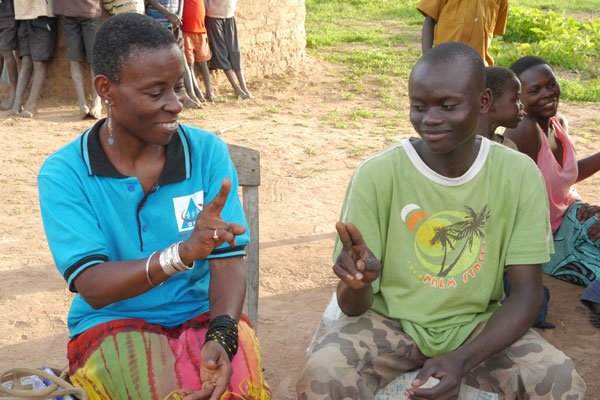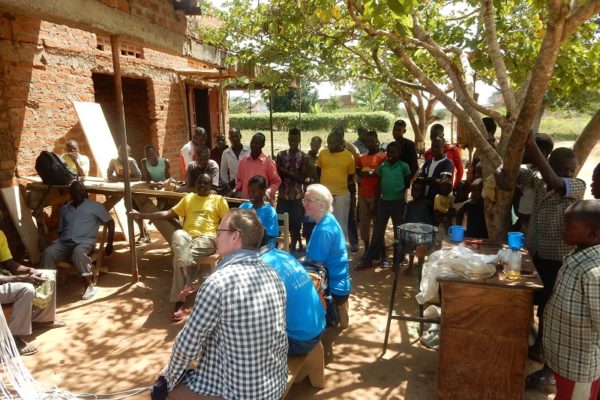“Deaf people are a great source of inspiration and encouragement. Their tenacity to survive and overcome the odds, are unmatched. I feel privileged to witness their inherent abilities and high IQ. Each person encountered is resourceful and dynamic: gifted in their own way; individual strengths reflect their ability to overcome daily barriers,” Barbra Nassozi Kiyaga told Daily Monitor.
“Over the years, I have been enriched and learnt a lot from them. As a close-knit deaf community with shared experiences and a common identity, their good nature is admirable as they constantly reach out to support one another. My service to the deaf therefore is a gift I share with the world: uplifting each other’s lives for the betterment of the human race,” she added.
A strong advocate for marginalised minority populations, Kiyaga is passionate about issues related to People with Disabilities (PWDs) in developing countries, with particular interest in deafness and hearing loss.
Kiyaga founded Deaf Link Uganda (DLU) in 2007. Working at grassroots levels, the Kampala-based organisation creates access to opportunities for deaf people in all sectors of life through the provision of education, social, economic, and cultural development. Deaf people comprise a marginalised and disenfranchised population that is rampantly discriminated against at all levels of society.
DLU work
DLU operates projects in urban, semi-urban and rural areas providing intervention services that enable deaf and hard of hearing individuals realise and utilise their potentials to become self-reliant citizens capable of contributing to community and national development.
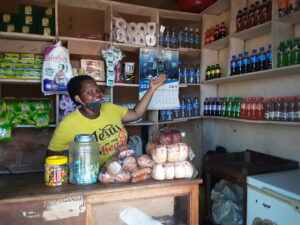 The organisation operates four major programmes to advance the welfare of deaf people: it promotes entrepreneurship through supporting innovative self-employed individuals who are economically self-sufficient; enables deaf children and youth gain access to educational and skills training opportunities; enhances the strength of the deaf community and instils dignity among individuals in their struggle to become productive member of society; and provides opportunities that enable one realise their potentials and gain a sense of self-worth which is significant to positive wellbeing.
The organisation operates four major programmes to advance the welfare of deaf people: it promotes entrepreneurship through supporting innovative self-employed individuals who are economically self-sufficient; enables deaf children and youth gain access to educational and skills training opportunities; enhances the strength of the deaf community and instils dignity among individuals in their struggle to become productive member of society; and provides opportunities that enable one realise their potentials and gain a sense of self-worth which is significant to positive wellbeing.
On DLU’s achievement so far, Kiyaga says the NGO is transforming the lives of deaf people through empowering interventions that are enabling them utilise their potential to lead meaningful and dignified lives as productive members of society. “Changes in their lives are evident through our educational, economic, social and cultural support services.”
According to Kiyaga, DLU is working at grassroots levels to engage families of the deaf and their communities in promoting deaf-friendly environments that nurture, value and appreciate the deaf.
Kiyaga says DLU continues to reach out to the deaf at all times and in all circumstances (especially during this daunting period of the pandemic). “We’ve remained relevant and steadfast in our commitment to service. Our initiative: “DLU Covid-19 Response: Deaf People at the Forefront” continues to uplift livelihoods through provision of humanitarian assistance: food relief, economic and community support.”
“DLU is continuously profiling deaf people to ensure their visibility and highlighting their uniqueness as a linguistic minority,” she adds.
Misconceptions
Kiyaga lists misconceptions about causes of deafness, stigmatisation, and lack of awareness about deaf people’s potential abilities as the main challenges that the deaf face in Uganda.
“There are misconceptions about causes of deafness that associate it with supernatural causes, resulting in their discrimination and marginalisation at all levels of society. The majority are dehumanised, victimised and treated as second class citizens; as a result, they are isolated, victimised and subjected to various forms of physical (including sexual violence) and psychological abuse,” Kiyaga says.
Adding: “Early in their lives, deaf children are rampantly denied life opportunities and grow up as disenfranchised adults, deprived of privileges to access education, economic, social and cultural amenities. The vulnerability and exploitation of deaf people as well as dealing with incidents of abuse of their human rights is a constant uphill struggle.”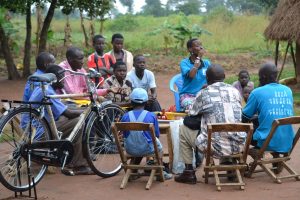
When asked what influenced her into forming DLU, Kiyaga replied: “During my childhood, I suffered from chronic otitis media and grew up with hearing loss. Throughout this time, my parents were committed to providing me with the best medical treatment. I underwent two surgeries, the first at the age of 13 at Aga Khan Hospital in Nairobi and later I was fitted with hearing aids.”
“My parent’s sacrifices testify to the person I am today, struggling with hearing loss yet evolving with unwavering determination to overcome the impairment. Their enduring love, care and sacrifices to secure for me a strong foundation in education, at an early age, steered and inspired my path towards a career of working with deaf people – it is the best choice I ever made,” she added.
According to Kiyaga, stigmatisation and discrimination of deaf people at all levels of society with negative attitudes towards them still rampant. “Derogatory words such as, Kasiru (Luganda word loosely translated as “stupid person”) to refer to the deaf.”
Lack of awareness
Kiyaga observes there is still lack of awareness about deaf people’s potential abilities. “The use of derogatory terms referring to a deaf person as Kasiru (Luganda word loosely translated as “stupid one”) reflects societies that undermine and relegate deaf people to a low social status.”
“Language and communication barriers resulting in lack of access to information is of particular concern, most especially during this time of the Covid-19 pandemic,” she says.
As to how these challenges can be addressed, Kiyaga says DLU is increasing awareness about deafness as well as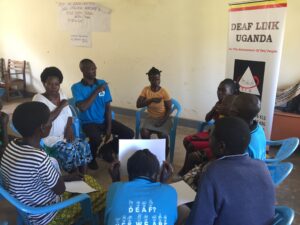 visibility of deaf people in education, economic enterprise, cultural and social arenas, promoting opportunities that boost their integration as valuable members of society.
visibility of deaf people in education, economic enterprise, cultural and social arenas, promoting opportunities that boost their integration as valuable members of society.
She suggests that there is need to advocate for the inclusion for the Sign Language in the national education curriculum so that it is taught as an additional language (like Swahili, French, among others). “This will break down communication barriers, increase the number of sign language interpreters and lead to greater understanding and appreciation of this unique language.”
Kiyaga notes that although policies to protect the rights of deaf and PWDs exist, these need to be implemented to eliminate rampant discrimination. She gives an example of banning the use of derogatory and abusive terms in reference to the deaf.
She says socio-economic empowerment is vital in opening up deaf people’s participation in the labour market, and other social arenas, such as visual and performing arts. Increase the number of schools for the deaf, with qualified teaching personnel fluent in the Sign Language.
She suggests that mainstream materials (especially on health) should be translated in formats that are accessible to the deaf. Income generating programmes should be set up and operated by the deaf to fund their activities.
Asked if Uganda has enough schools and other social amenities for its deaf citizens, Kiyaga replied: “No. Schools for the deaf in Uganda are extremely few and far between; most existing ones lack qualified teaching personnel to deliver quality education to deaf learners. These schools are commonly ill-equipped with inappropriate teaching resources and as a result, incidents of school dropout are high – with the majority leaving school illiterate and labelled as academic failures, in an education system that marginalises and constantly fails them.”
“Estimates indicate that less than 10 percent of deaf children attend school. At secondary level, Uganda has ‘only’ two secondary schools for the deaf, with numbers further decimated at higher educational institutes,” she added.
The National Population and Housing Census 2014 by the Uganda Bureau of Statistics defined disability prevalence as the proportion of the population aged two years and above who had difficulty in seeing, walking, hearing or remembering.
The “Uganda Bureau of Statistics 2019, The National Population and Housing Census 2014 – National Analytical Report on persons with disabilities” shows that overall about three in every 20 persons aged 5 years and above (about 3.8 million persons in absolute terms) had some form of difficulty, though mostly of moderate kind. Overall two percent of the population aged five years experienced severe difficulty while 12 percent had moderate difficulty.
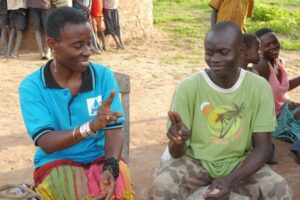
Representation
Asked if Uganda has passed the necessary legislation to protect Persons with Disabilities, Kiyaga replied: “Yes. The necessary policy framework and legislative documents to protect and uphold the rights of Persons with Disabilities (PWDs) do exist. The Uganda Government ratified and domesticated the UN Convention on the Rights of Persons with Disabilities (CRPD) containing relevant instruments pertaining to PWDs.”
“The law clearly specifies the inclusion for all and the elimination of all forms of discrimination. Regrettably, these documents are only good on paper, with glaring gaps that fall short of effective implementation. Very little has been done for these legislations to have a meaningful impact on the lives of Persons with Disabilities, majority of whom continue to remain on the periphery of society,” she added.
So how has the Covid-19 pandemic affected them?
“The pandemic has seriously affected the livelihoods of PWDs, rolling back years of enormous progress. Government Covid-19 response programmes largely ignore and neglect needs of disabled citizens with many remaining on the periphery of service provision. Communication and language barriers have cut off deaf from access to vital health information about the pandemic, exposing many to risks of infection and mental health problems.”
Asked why she finds her advocacy work for the deaf exciting, Kiyaga replied: “My daily encounters with the deaf are deeply enriching, with the privilege of closely interacting with them. My career with the deaf has never felt like work: it is a living as I’m fully submerged in it – with immense insights into their personal experiences; understanding how it feels to live as a deaf person. Despite their daily existence, they remain resilient and good natured. I never cease to admire these special qualities and talents.”
“Deaf people’s potentials (although undermined) are vast and vital to human development. Although categorised among disabled persons, the deaf possess a unique language that is extremely admirable – the beauty of communicating in Sign Language always captured my interest and imagination. That one relies purely on their visual sense for language shows that a deaf mind is highly refined,” she adds.
Kiyaga singles out financial constraints and lack of prioritising of the issues affecting disabled persons by the Government of Uganda as the main challenges hindering DLU’s work.
“Financial constraints pose huge limitations to our work, making it impossible to reach out services to this minority population. There’s lack of statistics to provide accurate information on the number of deaf people in Uganda,” she says.
“There is lack of interest at all government levels to priority issues of Persons with Disabilities, resulting in limited intervention programmes specifically targeting their needs. For example, there are no sign language interpreter services in health, law enforcement and court proceedings to cater for deaf persons. With a dearth of NGOs working with the deaf, heavy responsibility is placed on organisations (like DLU and a few others) to cater for an unknown and underserved minority population, which continues the cycle of neglect and discrimination,” she adds.
Kiyaga says she would have been a writer or an artist if she had not formed DLU.
belongs to Fun Cycling Uganda, a group of cycling enthusiasts who meet weekly to cycle.
Kiyaga says that she unwinds her busy days by riding her bicycle and gardening. “I frequently cycle to and from work, which is uplifting and refreshing, then I tend to my garden and plants while listening to music. That’s how my day normally ends.”
Kiyaga, the fourth child in a family of ten was born on November 9, 1968 in Kampala.
EAR HEALTH
According to WHO, hearing loss may result from genetic causes, complications at birth, certain infectious diseases, chronic ear infections, the use of particular drugs, exposure to excessive noise, and ageing.
Over 5 percent of the world’s population – 360 million people – has disabling hearing loss (328 million adults and 32 million children). Disabling hearing loss refers to hearing loss greater than 40 decibels (dB) in the better hearing ear in adults and a hearing loss greater than 30 dB in the better hearing ear in children. The majority of people with disabling hearing loss live in low- and middle-income countries, according to WHO.
source: Daily Monitor

